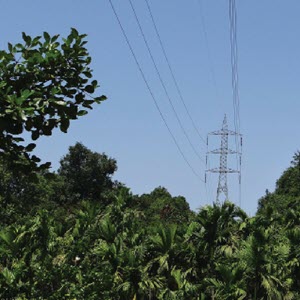Commentary from Clean EDGE Asia
Partnerships for a Just Energy Transition: Challenges and Strategies in Southeast Asia
Clare Richardson-Barlow explores the pivotal role that Just Energy Transition Partnerships play in shaping the trajectory toward a more sustainable and equitable energy future for the global South generally and Southeast Asia specifically.
Southeast Asia grapples with a multitude of serious environmental challenges, encompassing the broader landscape of climate change and energy transition imperatives that were debated at the 28th Conference of the Parties (COP28). As policymakers navigate these challenges, crucial questions emerge regarding the efficacy of existing policies and the need for innovative funding mechanisms and collaborative frameworks.
This commentary explores the pivotal role that Just Energy Transition Partnerships (JETPs) play in shaping the trajectory toward a more sustainable and equitable energy future for the global South generally and Southeast Asia specifically. By assessing the potential benefits and challenges associated with these partnerships, it outlines the path to developing nuanced strategies that would not only address environmental concerns but also incorporate considerations of justice in a comprehensive approach to global climate challenges.
A Holistic Approach to the Energy Transition
At COP26 in 2021, the South African government, in collaboration with the International Partners Group (IPG) consisting of the initial funders of France, Germany, the United Kingdom, the United States, and the European Union, introduced the Just Energy Transition Partnerships.[1] This strategic alliance aimed to mobilize $8.5 billion over the next three to five years, directed toward assisting South Africa in its decarbonization efforts. This pledge was followed closely by additional funding for Indonesia ($20 billion) and Vietnam ($15.5 billion).[2]
The JETPs, with their unique funding mechanisms and policy design frameworks, aspired to serve as a model for other developing nations with energy-intensive economies. These economies predominantly rely on high levels of energy consumption, primarily sourced from fossil fuels, and are often marked by high greenhouse gas emissions and a limited or growing utilization of renewable energy sources. This approach explicitly showcases how a developing country could incorporate decarbonization commitments into its nationally determined contributions. Moreover, the JETP mechanism underscores the collaborative efforts of developed countries, leveraging both public and private means, to provide financial support for developing countries in implementing their decarbonization strategies within their power systems.
In Southeast Asia, two JETPs are underway. One is poised for implementation in Indonesia, and another is preparing to launch in Vietnam.[3] The prospective success of these cooperative mechanisms not only has the potential to validate the feasibility and fundability of an equitable energy transition but also could serve as a catalyst for inclusive development. Conversations with policymakers in the region underscore the importance of a comprehensive approach to energy transitions via the JETPs, necessitating explicit considerations for energy access, effective modeling, and a nuanced comprehension of regional and domestic circumstances. The region’s distinctive challenges, exemplified by Indonesia and Vietnam’s geographic and socioeconomic diversity (including urban-rural divides, economic development goals, and entrenched fossil fuel interests), mandate tailored interventions to ensure an equitable and inclusive transition.
As Southeast Asia grapples with these complex challenges, a pivotal consideration emerges—the imperative for decision-making processes that are transparent and inclusive. Successful energy transitions hinge not only on strategic planning but also on the cultivation of an environment where stakeholders, communities, and policymakers engage in open dialogue. This forms the crossroads where holistic strategies become practical reality. In Southeast Asia’s transformative journey, the success of the JETPs will depend on decision-making characterized by transparency, inclusivity, and adherence to principles of justice.
JETPs thus present both opportunities and challenges for Southeast Asia. Policymakers need to meticulously consider the initial promise in the context of existing financial structures, country-specific challenges, the dilemma of loans versus grants, civil society participation, and human rights concerns. Specific cases in Indonesia underscore the need for approaches tailored to the exigencies facing individual country.
Key Considerations for Policymakers
To effectively assess JETPs and utilize them fully, policymakers should focus on several key points that will significantly determine outcomes in Southeast Asia.
- Initial promise and frustration. The initial promise and frustration of JETPs must be rigorously assessed to foster realistic expectations and address implementation challenges.
- Financial structure and transparency. Policymakers must scrutinize the financial support provided, ensure transparency, and explore the infusion of more concessional finance to underpin a just transition.
- Country-specific challenges. The unique challenges in each recipient country must be discerned and addressed, including impediments to accessing funds and potential socioeconomic repercussions.
- Dilemma of loans versus grants. The equilibrium between loans and grants must be re-evaluated to prioritize justice and social protection measures within the transition.
- Civil society participation and human rights. Policymakers should encourage early-stage participation by civil society and attentiveness to human rights concerns to align JETPs with principles of justice.
- Specific country cases. JETPs must be tailored to the specific challenges of each country, navigating intricacies such as Indonesia’s exemptions and Senegal’s emphasis on clean power generation.
- Coordination and streamlining. Coordination must be improved through the creation of a coordinating entity (potentially a multilateral development bank) to streamline funds and enhance accessibility.
- Long-term viability. Policymakers should deliberate on the enduring viability of JETPs, considering potential reforms and increased capital for multilateral development banks.
As Southeast Asian nations engage with JETPs, stakeholders bear the responsibility of guiding a just and resilient energy transition. A just transition in this context would ensure that the energy and subsequent economic transformation is inclusive, leaving no vulnerable segments of society behind. Transparent and inclusive decision-making forms the foundation of an equitable transition, allowing diverse perspectives to contribute to the policy discourse. Policymakers are crucial actors in fortifying JETPs, embedding principles of justice into the transition process. This involves considerations for social protection, community engagement, and a commitment to human rights.
Fundamentally, the success of JETPs in Southeast Asia is contingent not solely on energy metrics but also on the incorporation of justice into the region’s climate narrative. Policymakers, as stewards of this process, must refine and operationalize JETPs to ensure that the transition is not only sustainable but also emblematic of the region’s commitment to justice. Through their leadership, Southeast Asia can continue along a trajectory where the benefits of the energy transition are equitably distributed, establishing a sustainable foundation for future generations.
Clare Richardson-Barlow is a Lecturer at the University of Leeds and a Nonresident Fellow at the National Bureau of Asian Research.
Endnotes
[1] The IPG members include Japan, the United States, Canada, Denmark, France, Germany, Italy, Norway, the European Union, and the United Kingdom, which make up the additional donor pool.
[2] UK Cabinet Office, “Indonesia Just Energy Transition Partnership Launched at G20,” Press Release, November 15, 2022, https://www.gov.uk/government/news/indonesia-just-energy-transition-partnership-launched-at-g20.
[3] U.S. Embassy and Consulates in Indonesia, “Indonesia Just Energy Transition Comprehensive Investment and Policy Plan Launched,” Press Release, November 22, 2023, https://id.usembassy.gov/indonesia-just-energy-transition-comprehensive-investment-and-policy-plan-launched; and Foreign, Commonwealth and Development Office (UK), “Political Declaration on Establishing the Just Energy Transition Partnership with Viet Nam,” Policy Paper, December 14, 2022, https://www.gov.uk/government/publications/vietnams-just-energy-transition-partnership-political-declaration/political-declaration-on-establishing-the-just-energy-transition-partnership-with-viet-nam.



